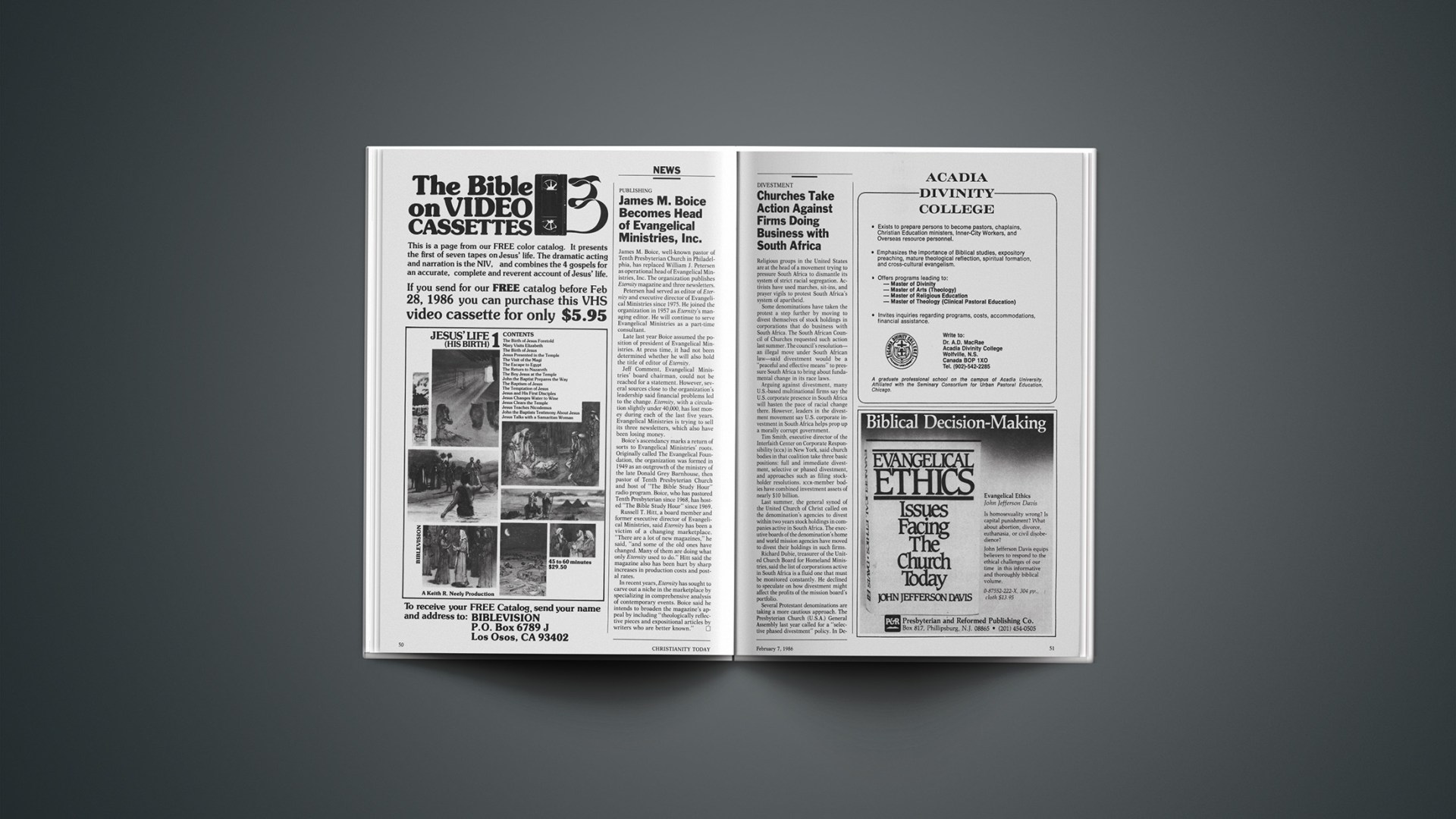Religious groups in the United States are at the head of a movement trying to pressure South Africa to dismantle its system of strict racial segregation. Activists have used marches, sit-ins, and prayer vigils to protest South Africa’s system of apartheid.
Some denominations have taken the protest a step further by moving to divest themselves of stock holdings in corporations that do business with South Africa. The South African Council of Churches requested such action last summer. The council’s resolution—an illegal move under South African law—said divestment would be a “peaceful and effective means” to pressure South Africa to bring about fundamental change in its race laws.
Arguing against divestment, many U.S.-based multinational firms say the U.S. corporate presence in South Africa will hasten the pace of racial change there. However, leaders in the divestment movement say U.S. corporate investment in South Africa helps prop up a morally corrupt government.
Tim Smith, executive director of the Interfaith Center on Corporate Responsibility (ICCR) in New York, said church bodies in that coalition take three basic positions: full and immediate divestment, selective or phased divestment, and approaches such as filing stockholder resolutions. ICCR-member bodies have combined investment assets of nearly $10 billion.
Last summer, the general synod of the United Church of Christ called on the denomination’s agencies to divest within two years stock holdings in companies active in South Africa. The executive boards of the denomination’s home and world mission agencies have moved to divest their holdings in such firms.
Richard Dubie, treasurer of the United Church Board for Homeland Ministries, said the list of corporations active in South Africa is a fluid one that must be monitored constantly. He declined to speculate on how divestment might affect the profits of the mission board’s portfolio.
Several Protestant denominations are taking a more cautious approach. The Presbyterian Church (U.S.A.) General Assembly last year called for a “selective phased divestment” policy. In December, the denomination divested its stock in Mobil, Texaco, Newmont Mining, and Fluor after those corporations indicated they would not cease operations in South Africa. William Somplatsky-Jarman, of the church’s General Assembly Council, said he expects the action to result “in no loss of performance” to the denomination’s stock earnings.
The pension board of the Lutheran Church in America (LCA) refused in November to file stockholder resolutions with several companies doing business in South Africa. The board’s investment committee said urging companies to withdraw from South Africa could result in a “gift” of corporate assets to the South African government. The board’s failure to act stirred sharp criticism from the LCA’s executive council, which had asked the pension board to file the stockholder resolutions.
Similarly, the General Board of Pensions of the United Methodist Church has rejected the urgings of church activists for full divestment. Last July, the board went against the denomination’s general conference, which in 1984 urged all church agencies to divest South Africa related securities.
“We would have no leverage if we sell our shares to someone who couldn’t care less,” said Gerald Hornung, chief executive of the United Methodist pension board. The board manages the largest church pension fund in the United States. Pension fund managers instead vowed to intensify their pressure on corporations to adhere to the Sullivan Principles, a set of guidelines for improving working conditions for black South Africans.
Some denominations, including the Southern Baptist Convention (SBC), maintain a policy of nondivestment. “We prefer to stay on the inside and pressure the corporate management to change,” said SBC annuity board president Darold Morgan.
Divestment activity within the Roman Catholic Church—where each diocese controls the investment of its own assets—has been slow. “The dioceses are waiting for the [U.S. Catholic] Conference to come out with a policy before making any moves of their own,” said conference representative Rollin Flambert. He said the formulation of a policy depends to some extent on “guidelines we receive on the matter from the South African bishops.”
In the meantime, many Catholic dioceses are studying the issue on their own. The Milwaukee archdiocese last year divested itself of Citicorp bonds because the corporation has made loans to the South African government.
RELIGIOUS NEWS SERVICE










